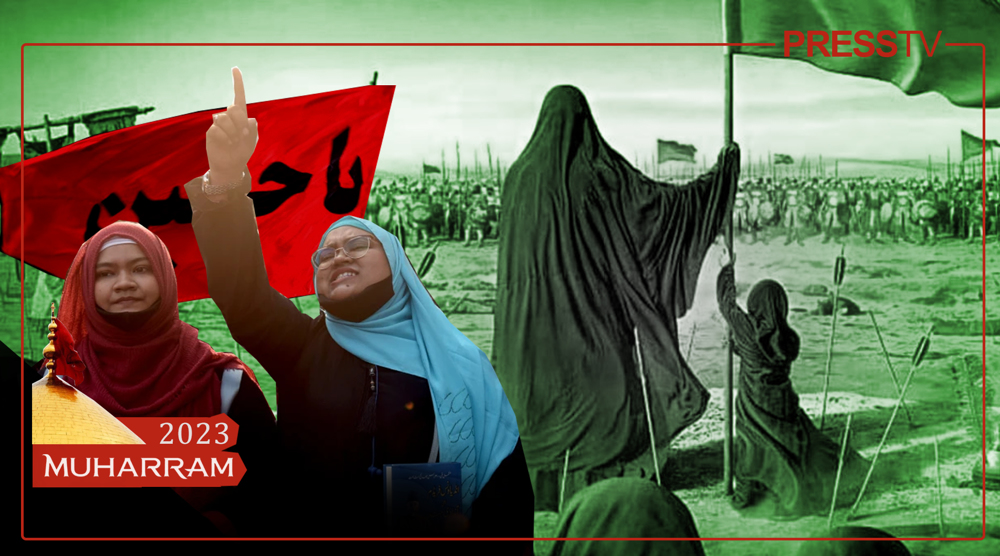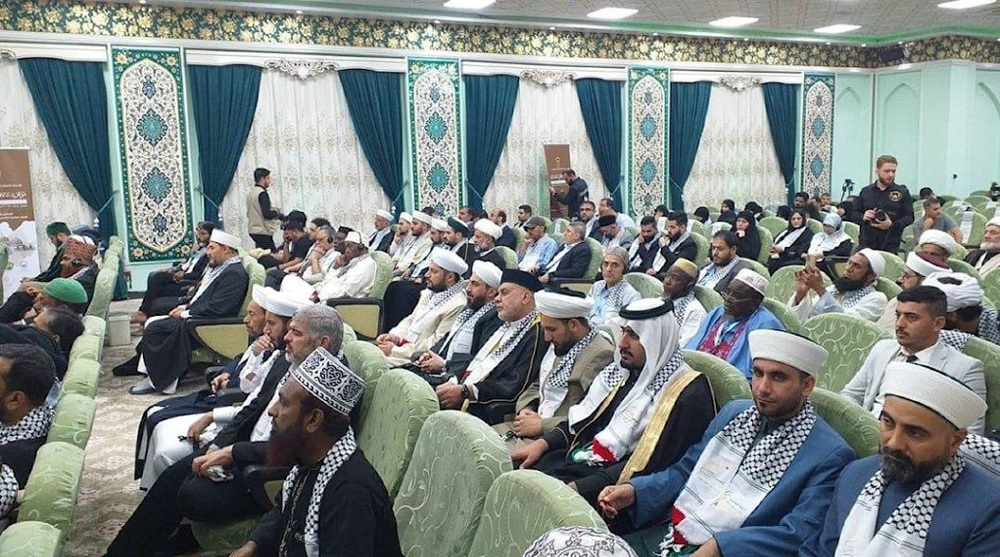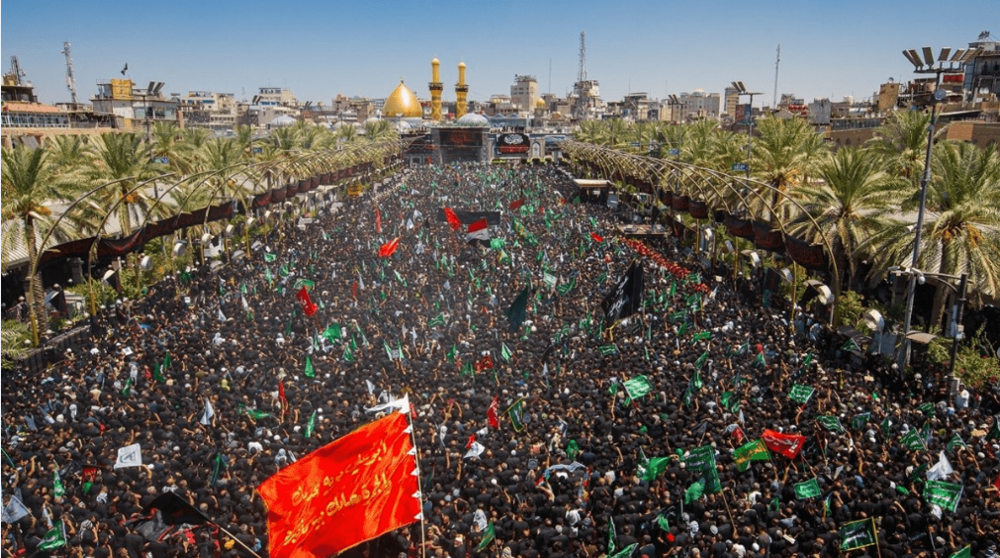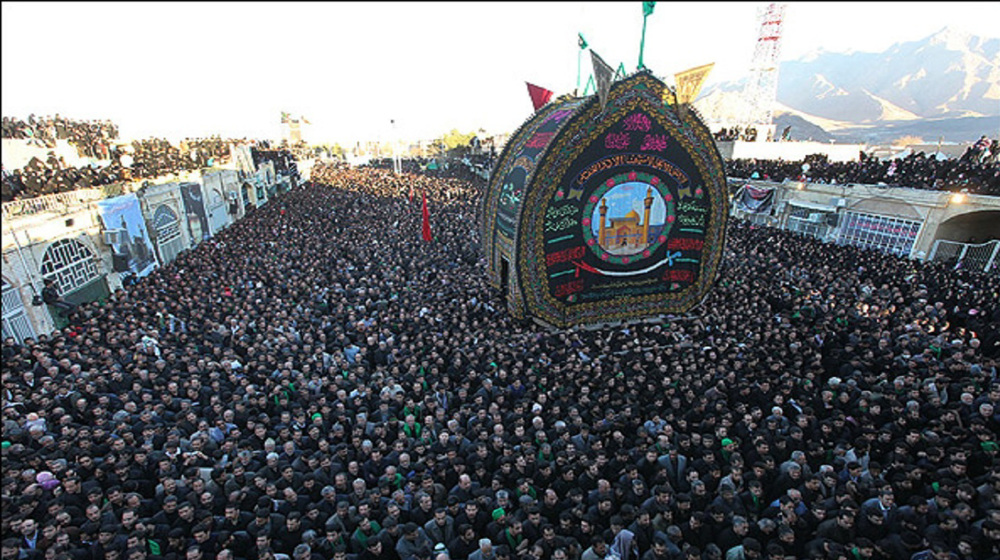Women of Karbala: Zainabi model of resistance, resilience in today's world
By Batool Subeiti
There are two fundamental elements of the immortal battle of Karbala without which divine victory for the righteous men and women would not have been possible: martyrdom and the propagation of the divine message of Islam that the tyrannical systems sought to eliminate.
If Imam Hussain (AS) is the ‘Master of the Martyrs of Karbala’, Sayyeda Zainab (AS) is rightly the ‘Master of the Messengers of Karbala.’
If Imam Hussain (AS) and his small group of loyal companions bravely struggled against the tyrannical Umayyad regime of Yazid with their swords and offered supreme sacrifices, Sayyeda Zainab (AS) and other ladies of the holy household fought with written and spoken word.
Simply put, the movement of Karbala would not have survived fourteen centuries without Sayyeda Zainab (AS) and what she accomplished in the aftermath of Karbala. She is the savior of Karbala.
This divinely ordained role was assigned to the women of the Ahlulbayt (family of the Prophet PBUH), as Imam Hussain (AS) before he left Medina saw Prophet Mohammad (PBUH) in his dream telling him: “Verily Allah wills to see you martyred. Verily Allah wills to see your family as captives”.
While there is no dearth of revolutions throughout history, never have we seen the whole family participating and getting martyred in a battle: brothers, sons, nephews as well as companions.
What is this secret that gave such exemplary conviction to Imam Hussain’s (AS) family and companions, who accepted martyrdom and captivity on the fateful day of Ashura?
This is something out of the ordinary and demonstrates the philosophy of the existence of man, which says falsehood should never prevail over truth.
When Sayyeda Zainab (AS), in the court of Yazid, said she saw "nothing but beauty”, she foresaw the victories of the oppressed over the oppressors, generations upon generations to come.
One of the most famous examples is when the granddaughter of Prophet Mohammad (PBUH) confronted Yazid in his Damascus palace and delivered a powerful speech.
“Plot your plan, and strive however much you can, for by Allah you will never erase our memory, or kill our revelation, or understand our reach” Sayyeda Zainab (AS) stated amid stunned silence.
"But remember that you have only cut your own skin, and your own flesh to pieces”.
She told Yazid and his minions that with the actions they committed against the holy household in Karbala and in the aftermath of Karbala, they only earned shame and humiliation for themselves, for truth always prevails over falsehood and might is always bound to vanish.
At the same time, she envisioned beauty in the events that unfolded in Karbala, which revived and consolidated Islam, a religion revealed to her grandfather Prophet Mohammad (PBUH) by Allah.
This speech, which was powerful, succinct, courageous and forecasted the future, was delivered at her weakest point when she was taken as a captive in chains, when she was mourning her beloved brother and when she was worried about small grief-stricken children in her caravan.
Taking inspiration from Karbala, when the former leader of the Islamic resistance movement in Lebanon a couple of decades ago famously stated "Israel has fallen", some did not take the statement seriously, as it was said at a time when the wrong state was at the peak of its power and the resistance movement wasn't as powerful as it is today.
It is clearly mentioned in the Holy Quran that "falsehood is bound to perish", and any form of oppression can never sustain because oppression is in its very essence unnatural.
Sayyeda Zainab (AS) was the commander of a soft war that effectively thwarted the nefarious plots of enemies, even while she was in captivity, suffering the worst ordeal.
She demonstrated how women in Islam can be change-makers and participate in socio-political activities. Alongside Imam Sajjad (AS), she redefined the concepts of resistance and resilience.
Muslim women of today, who are torn between the "liberal, feminist" West and the "backward, cultural" East, should look at women role models such as Sayyeda Zainab (AS) and her mother Sayyeda Fatima (AS), whose historic Fadak sermon is still remembered by justice seekers.
Today, we see women emulating women of the holy household in the Islamic Republic of Iran, whereby the Hijab is seen as an essential component to strengthen the family institution and to facilitate the participation of women in the socio-political affairs of the country.
Imam Khomeini, founder of the Islamic Revolution, speaking to a group of scholars after the 1979 Islamic Revolution, said: "Do you think it is your speeches that have brought down the Shah? It is these very women, treat them with honour!"
He acknowledged women's role during the revolution that toppled the Pahlavi regime and established Islamic rule in Iran. Women were at the forefront, helping men as they fought the West-backed authoritarian regime. They continue to be active today, in different fields.
Karbala also gives lessons in the spirit of selflessness as exemplified by women of the holy household. For example, Ummul Banin (AS), the mother of Abolfazl Abbas (AS), who was in Medina during the Karbala battle, enquired about the well-being of Imam Hussain (AS) from Sayyed Zainab when the caravan returned, not the fate of her own children.
When she was told that her four children attained martyrdom, her reply was touching: "May my family be sacrificed for him (Imam Hussain AS)!”
This culture of selflessness was seen in Iran in the mid-1980s when women sent their children, spouses and siblings to defend the Islamic Republic from the Baathist regime.
Again, when Zionists attacked southern Lebanon in July 2006, and when the Daesh terrorist group laid siege around holy shrines in Iraq and Syria.
Today, Muslim men and women equally must unmask the true face of oppressors, wherever they are, and this duty is no less important than that of Sayyeds Zainab (AS).
People of conscience must give blood or convey the message of that blood to future generations. Martyr Bint Al-Huda, sister of Martyr Baqir al-Sadr, is a prime example of a contemporary woman who embodied the virtues of Sayyeda Zainab (AS).
Islam does not distinguish between genders when it comes to activism, and the women of Karbala prove women can also bring revolutions and overthrow mighty empires.
Batool Subeiti is a UK-based energy engineer, political activist and writer.
VIDEO | Tehran residents condemn US-Israel orchestrated mosque arson, vandalism
VIDEO | South Koreans demand end to joint US military drills and provocative policy against North Korea
VIDEO | A silent grief: Palestinian man struggles to recover remains of wife, children
Hind Rajab Foundation files complaint against Israeli genocidal propagandist in US
VIDEO | Trump fighting allies on Greenland
Iran FM: Selective respect for deals now haunting Europe
Arab rights group urges UK to sanction Netanyahu over 'incitement to genocide' in Gaza
‘Political, non-constructive’: Iran slams UNHRC special session on recent riots










 This makes it easy to access the Press TV website
This makes it easy to access the Press TV website